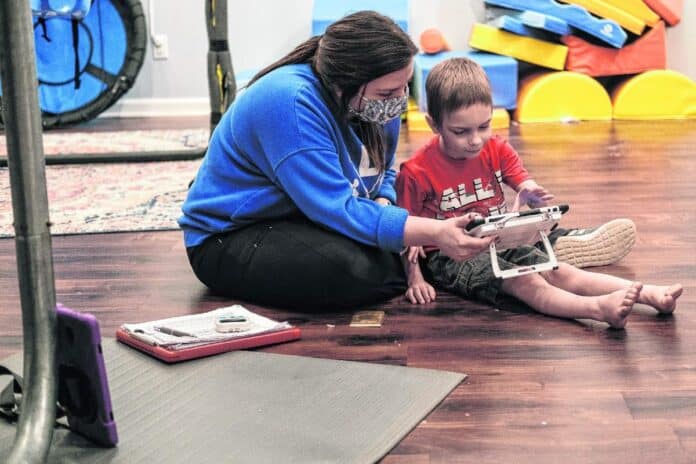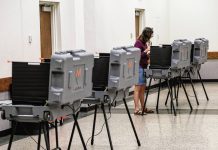
Imagine walking into a room for the first time. For most people, this means taking in the full scope and surroundings. Then they start to focus on the details and smaller pieces that make the room what it is.
Now imagine you’re walking into a room and it is the details that catch your eye first, one at a time, instead of the bigger picture. You are drawn to one corner, one inch, before you take in the whole setting.
For some people with autism, this scenario — seeing and emphasizing the individual components first — is an apt description of how they experience the world, said Imprint Pediatric Therapy owner and founder Shawn Steen.
“There’s this great book called ‘The Reason I Jump’,” she said. “And he describes how when we go into a room, we see the large room and we take it all in, and we have to go back and look for the details.”
She continued, “Something that a lot of our kiddos do is they naturally start at a corner of the smallest detail and then they move it outwards, so they can see the picture almost one pixel at a time, appreciating each part of the process and how their world isn’t taken in by such overload, but really taking in the second by second, appreciating the beauty of each individual step of the way. And I love that idea, that explanation behind how a beautiful mind works like that.”
Celebrating differences
Steen’s business, Imprint Pediatric Therapy, provides therapy for children with autism. As part of its celebration of Autism Awareness Month, Imprint will sponsor a “Sensory Day” event from 1 to 4 p.m. Saturday in Mill Race Park.
The event will “celebrate differences coming together” and provide various ways for kids to enjoy sensory input.
The event will include bubble machines, food trucks, games, cotton candy, balloons, bounce houses, sensory art and games, according to Steen and office manager Kristy Heiman.
The event offers something for kids and adults of all ages, including adults with autism. It is open for all families to attend and those who attend are asked to wear a mask. For kids with “sensory processing” issues who are uncomfortable wearing masks, they will not be required. However, she asked that parents and adults who are more used to masks wear theirs.
There will be signs reminding kids to social distance as they wait in line for the bounce houses, Heiman said. Only a limited number of kids will be let in at a time, she said, and the houses will be sprayed down between groups. She also said that food vendors will have gloves and masks, and all provided games will be large and easy to clean.
“[Sensory Day’s] purpose is to let families know that we’re here and also people looking to be connected and a part of an organization where they can invest in,” Steen said.
Sensory Day is just one of the events that the business is holding in April to celebrate and promote Autism Awareness Month.
On April 3, the business worked with the city to hold an Easter egg hunt. According to the event’s Facebook page, the event was a “sensory friendly/quiet egg hunt for individuals with disabilities and sensory processing disorder.” It was organized through the Columbus Parks and Recreation Department and co-sponsored by WKKG and Imprint.
The following week, Imprint focused on staff recognition. Then, after their Sensory Day event, the organization is planning a “spirit week,” which Heiman said will benefit Columbus Autism Network.
“Out of a need”
Imprint Pediatric Therapy was established in 2019.
“We started out of a need,” Steen said. “… I felt like there was definitely a deficit in services.”
Steen has worked with special education and in the school system and has started nonprofits in the past. She said that when she found Applied Behavior Analysis (ABA), she saw it “restore hope to families.”
“You see kiddos have their first word,” she said. “You see kids try new foods. You see kids conquer skills that parents are worried that they may never have. And those moments are once-in-a-lifetime moments that I get to be a part of for so many kids. I just love it. So that’s really where my heart comes from and my passion.”
Psychology Today defines ABA as “a type of therapy that focuses on improving specific behaviors” commonly used for children with autism. According to Imprint’s website, ABA “uses reinforcement principals to increase target behaviors, allowing for the advancement of communication and living skills.”
There are nuances to how different providers implement ABA, Steen said. At Imprint, she said, they guarantee “180 learning opportunities every hour” for kids. Rather than having to sit at a desk all the time, kids are “immersed in a learning experience that can happen truly anywhere in the building.”
“Our kids learn on the floor, in the hallway, in the gym, on the trampoline,” she said. “We’re always seeking those learning opportunities. And I think that is a big thing that sets us apart, where our therapists are like big kids, and they are just having fun right next to and alongside.”
Pandemic impact
However, as with any other child-centric business, Imprint faced changes and challenges amid the pandemic. Steen said that at one point, the business did a mix of both in-clinic service and home visits. Then, when the clinic was closed for six weeks, their board certified behavior analysts provided parent training.
“So our BCBAs stepped up to the plate, and they definitely knocked it of the ballpark, meeting with every family weekly or one or two times a week to give them parent training, so they could have the support they needed to continue the kids’ therapy while they were in the in-home orders,” she said.
Steen said that Imprint also provided “off-the-floor tasks” for salaried workers, and staff made YouTube videos to help kids feel connected to their Imprint community. These videos feature subjects such as science, crafts, exercise and reading.
Upon returning to the clinic, kids were slowly introduced back in, and therapists worked with the same respective kids for an extended period of time in order to enable contact tracing, if needed.
Some of the changes due to COVID-19 have included social distancing, schedule changes, increased cleaning for both toys and facilities and having therapists eat separately from children so they don’t remove their masks around them.
The business still found ways to celebrate in 2020, such as having its first graduation with social distancing, making gift bags for students on the Fourth of July and providing individually wrapped cookies as part of a “Grinch-mas” party.
“We did not miss an opportunity to celebrate. We just celebrated differently,” she said.
Heiman said that while the center couldn’t hold last year’s planned Sensory Day event due to COVID-19, they were able to make gift bags full of sensory toys, and she dropped them off for kids.
Learning about differences
When asked what she’d want people to know about autism, Steen replied, “Autism is unique to each family, unique to each individual and that, while it may not be what you thought or what you were expecting, it’s still a beautiful journey.”
She said that it’s also important to remember that people on the autism spectrum have different skills and deficits, just like anyone else, and that “differences are what make the world colorful.”
Steen had her own experience with learning differences. She was diagnosed with dyslexia as a sophomore in high school. From a young age, she had to work hard to keep up with her education.
“My mom really pulled me out of the crack every day,” she said. “So I would go to school and learn all day long. And then I would come home from school, and she would reteach me everything with a hands-on approach. And that was the only way I could learn.”
As Steen prepared for middle school, her mother encouraged her to start setting aside time to meet with each of her teachers one-on-one. Steen kept up this practice from sixth grade to her senior year of college.
“I don’t want learning to be so hard for everyone. And it doesn’t have to be,” she said.
“My goal is to get kids to the least restrictive environment, which is the school setting,” Steen said. And if we were to work together and bridge the gap to close those cracks … we would really be changing lives then. And so my goal is that we unify and come together and have an approach where we’re all reaching down for the depths of the kiddos that are sinking.”
She wants to help kids who are close to slipping through those cracks for any reason, whether it’s because of learning disabilities, poverty or abusive environments.
“While Imprint is where we’ve started, it’s definitely not the end,” she said.
In talking about autism awareness, Steen mentioned the imagery of a flag. Instead of putting it at half-mast to mark “defeat or sadness,” they are “raising it high” with honor, pride and support as they enjoy getting to be a part of families’ and children’s lives, she said.
“Raising awareness about autism means that we get to be a part of a world that we never imagined and we can’t think of on a regular basis, but it really is beautiful,” she said.
[sc:pullout-title pullout-title=”If you go” ][sc:pullout-text-begin]
What: Sensory Day
When: Saturday, Apr. 17. 1-4 p.m.
Where: Mill Race Park
Additional information: Attendees are asked to wear a mask. Kids with sensory processing issues who are uncomfortable wearing masks will not be required to do so. However, parents and adults who are used to masks should wear theirs.
[sc:pullout-text-end][sc:pullout-title pullout-title=”Where to learn more” ][sc:pullout-text-begin]
For more information about Imprint Pediatric Therapy, visit www.imprintpediatrictherapy.com.
In addition to its main clinic at 315 Washington Street, Steen said that the business has added facilities at 217 and 531 Washington (which houses older kids).
“We have done that for COVID precautions, but additionally, just for space needs too,” she said.
She added that they’ve also purchased a property at 2600 Sandcrest Drive and hope to be inside by fall.
[sc:pullout-text-end]




